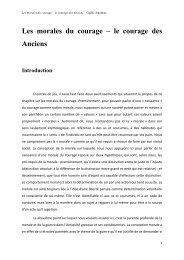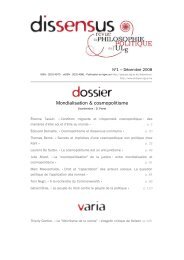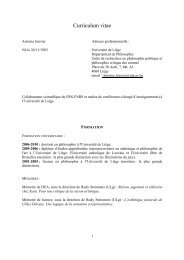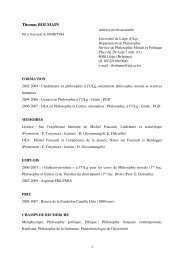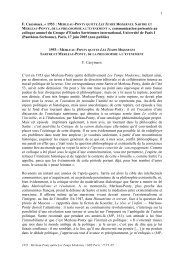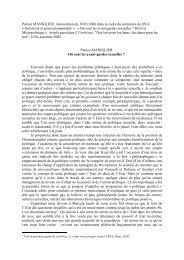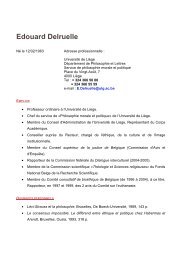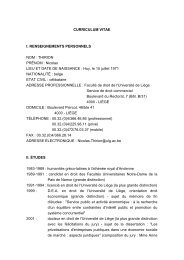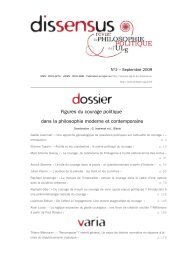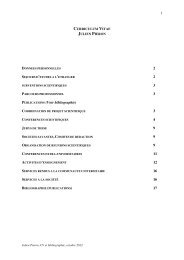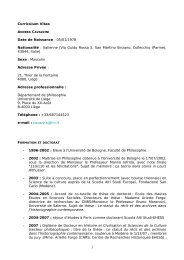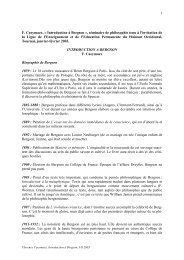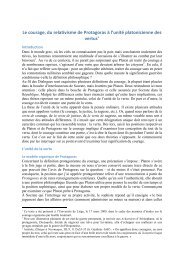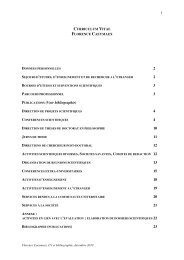Subjectivations politiques et économie des savoirs - Service de ...
Subjectivations politiques et économie des savoirs - Service de ...
Subjectivations politiques et économie des savoirs - Service de ...
You also want an ePaper? Increase the reach of your titles
YUMPU automatically turns print PDFs into web optimized ePapers that Google loves.
– Sophie Bourgault: « Prolegomena to a rehabilitation of Platonic mo<strong>de</strong>ration » – p. 125<br />
ambivalente, suj<strong>et</strong>te à <strong><strong>de</strong>s</strong> jugements contradictoires : la définir est redoutable 17 . »<br />
Adding another dimension to our challenge is the fact that Plato <strong>de</strong>als with mo<strong>de</strong>ration<br />
from consi<strong>de</strong>rably different angles throughout his corpus: for instance, while the<br />
Charmi<strong><strong>de</strong>s</strong> puts great emphasis on self-knowledge, the Republic stresses obedience,<br />
and the Gorgias un<strong>de</strong>rscores – within a harsh critique of Athenians’ lust for power – the<br />
need for self-control. Now, we may do well to use the term mo<strong>de</strong>ration and to avoid<br />
using « temperance » as an English ren<strong>de</strong>ring (as is increasingly done by English<br />
translators) – for « temperance » naturally raises in the contemporary rea<strong>de</strong>r’s mind a<br />
host of associations with turn-of-century campaigns for prohibition. It is thanks to<br />
Christian temperance movements and also to the lasting impact of medieval Christian<br />
thought, that the i<strong>de</strong>a of temperance/mo<strong>de</strong>ration has come to be associated, quite<br />
narrowly, with asc<strong>et</strong>icism or abstinence – wh<strong>et</strong>her it be from alcohol or sex. I believe<br />
that it is such narrow reading that is partially responsible for the neglect of the virtue of<br />
mo<strong>de</strong>ration: few i<strong>de</strong>as seem to be as unpalatable to the average North American babyboomer<br />
as abstinence.<br />
The association ma<strong>de</strong> b<strong>et</strong>ween mo<strong>de</strong>ration and asc<strong>et</strong>icism is not, of course, totally<br />
unjustified. In the City of God, Augustine insisted that the Greek term sophrosyne<br />
referred above all to an individual’s struggle against the flesh and the carnal passions<br />
(XIX, 4), and similarly, Aquinas’ treatment of temperantia in the Summa Theologica (a<br />
treatment heavily inspired by Aristotle) gave much weight to humility and chastity. But<br />
this is not to say that Christian temperantia only comes down to abstinence and a<br />
quest for purity. In<strong>de</strong>ed, there is a lot more to both Christian and Platonic mo<strong>de</strong>ration<br />
than bodily discipline: the virtue is imbued with complex cognitive and political<br />
dimensions. 18<br />
Scholars’ blindness to mo<strong>de</strong>ration’s complexity may be a result of the<br />
popularity of Friedrich Ni<strong>et</strong>zsche – who famously attributed to both Plato and<br />
Christianity a <strong>de</strong>ep hatred of the body. Now, although Ni<strong>et</strong>zsche’s reading of Plato has<br />
been disputed by many 19 , there is still a residual ten<strong>de</strong>ncy amongst political theorists<br />
to associate Plato with asc<strong>et</strong>icism or at least, with a tyrannical « hyper rationalism ».<br />
One could think of the work of the late Hannah Arendt, or that of Martha Nussbaum,<br />
who presents, in her Fragility of Goodness, quite an asc<strong>et</strong>ic reading of the Republic and<br />
17<br />
18<br />
19<br />
M.-F. Hazebroucq, La folie humaine <strong>et</strong> ses remè<strong><strong>de</strong>s</strong>. Charmi<strong>de</strong> ou <strong>de</strong> la modération, Paris, Vrin, 1997,<br />
p. 10.<br />
For instance, we will note below the political consequences of the love of money. On that issue, Plato<br />
and the Bible speak with one voice: the love of money is consi<strong>de</strong>red to be a great source of evil. The<br />
most famous passage is 1 Timothy 6:9-11. See also Hebrews 13:5; James 5: 1-6; Ecclesiastes 5:10;<br />
Luke 12:15.<br />
C. Zuckert, Postmo<strong>de</strong>rn Platos, Chicago, University of Chicago Press, 1996; W. Brown, « "Supposing<br />
Truth Were a Woman…" Plato’s Subversion of Masculine Discourse », Political Theory, 16(4), 1988, p.<br />
594-616.



